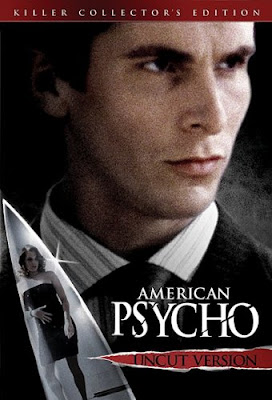
In accordance with my promise to make women directors a prominent feature of this blog, I recently watched American Psycho, which is a Marry Harron film. Actually, it was more of a fortuitous accident, since my family felt like communing to watch some kind of horror movie. The Blockbuster selection was epically weak, but they did have this one. And I thought, aha!
For the most part, I really dig this movie. It's an excellent adaptation of the Bret Easton Ellis book. Harron's film is equal parts satire and moody horror. For the most part, she manages to negotiate between fear and humor (though more fear and less humor would have been appreciated on my part, but that's just personal taste). Both the film and the novel are an overt criticism of the Reagan era. It appears that the deranged psycho-path, Patrick Bateman (Christian Bale) is forged in the primordial ooze of inescapable superficiality and dog eat dog economics that characterized mega-rich society in Reagan's America. With his immaculate exterior and rotten core, Bateman is the embodiment of the Regan 80s. Working an ambiguous job on Wall Street, Bateman spends his free time either fantasizing about or commiting brutal and disgusting crimes. It is the American dream gone haywire. When you were born at the top, I guess the only place to go is down, and to take as many people as you can with you. Interestingly, Bateman does not have a preference for victims. He takes the lowest of the low (a homeless man, a hooker) along with the most successful, without discretion.
One can never quite tell whether Bateman actually performs the gratutious acts depicted, or if they are elaborate, consuming fantasies. If they are real, they are readily ignored in the solipsistic city-dwellers. Not only are the characters self-absorbed, but they are practically interchangeable, reduced to virtual clones by marketing schemes, the drive to have the best. Actually, they are literally interchangeable--so alike that men are constantly mistaken for one another. It is never apparent whether Bateman gets away with murder because the people around him are truly apathetic, or if his fantasy world has overtaken his reality. This is just one more way Harron creates a duality throughout the film. She also has a way of portraying unease through the extravagances of the rich, showing the rawness lurking behind the perfect facade. The intense close up of syrup on a gourmet plate is blood spatter, and the face mask Bateman removes makes him look like a slasher villain a la Michael Myers.
Visually, this film is practically noirish. In the office buildings, we often see the shadows of venetian blinds cast across the scenes. In a way, its not hard to draw comparisons to noir, here. A private detective even shows up, yet there is too much conflicting evidence to pin down whether a crime has been committed or not. Shot mostly at night, the city is very Gotham-esque, overbearing, angular and grim; it is a city where evil abides, yet there is no superhero to counteract this menace. The outdoor scenes starkly contrast the interior scenes, particularly those in Bateman's apartment, where there is nothing but clean, uncluttered, modern lines.
The film would have benefited from a larger part for Bateman's secretary, Jean (Chloe Sevigny), who offers a more empathetic perspective. She is bumbling and pathetically naive. As a result, during her too-short screen time, I found myself praying for her deliverance. It's an interesting film, although it sort of peters out at the end. It is left ambiguous whether Bateman has imagined it all. As a result, nothing changes. There is no digging to find a message, either. At times the satire is just a bit too over the top, like the moment where Bateman is dragging a body through his building and an acquaintance inquires about the make of the bag. It's an imperfect film, but still a very interesting one.

No comments:
Post a Comment